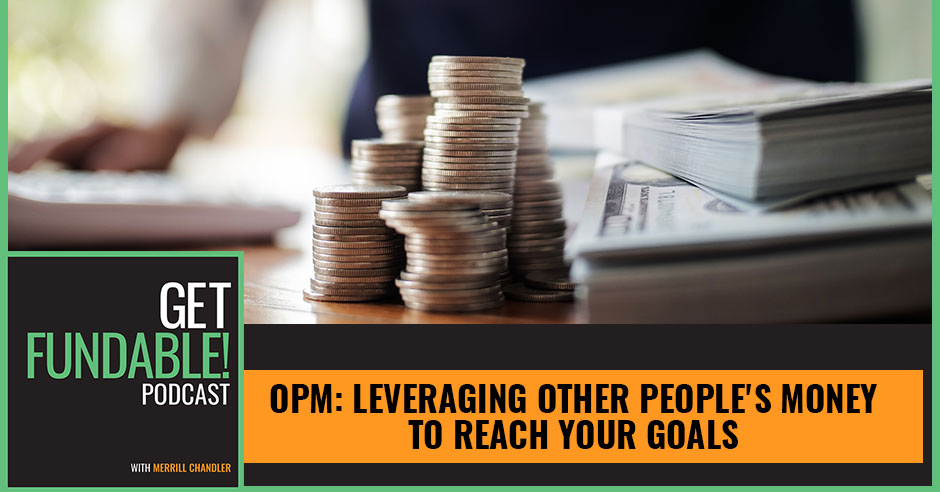
Today, Merrill Chandler goes back to the basics and teaches us how to leverage other people’s money to reach our goals. Learn why building a relationship of trust is important for OPM and money lending. Discover the different forms of OPM and know how to build a reputation so that you can get a high score from lenders. Tune in and learn all you need to know about managing other people’s money.
—
Watch the episode here:
Listen to the podcast here:
OPM: Leveraging Other People’s Money To Reach Your Goals
In this episode, I am going to the fundamentals of the fundamentals, where everybody’s heard of the term OPM, but the vast majority of folks haven’t connected the dots. They haven’t done the math of what it means to borrow other people’s money. What are some of the emotional overheads that come with some types of borrowing and what are some of the financial and calculations we got to be prepared for within measuring our relationships and our reputations? We’re going to handle all that.
—
We’re talking about those three magic letters. No, not CIA. Not FBI. No, we’re not talking about the IRS. We’re talking about OPM. What’s that spell? Other People’s Money. We got some great feedback from some of our boot camps and in my Into the Madness Series that we do for all of our funding hacker tribe members. What came to us was, we make assumptions. I make assumptions about so many things. I’ve been doing this for several years. For good or ill, I make assumptions that everybody knows everything about what I’m talking about.
Now, we’re going back to the basics. When I say go back to basics, we’re talking about the fundamental tool that creates wealth for every single human being who implements it. That tool that wealth strategy is using other people’s money to invest, grow and implement the strategies and ambitions that you have for your life, other people’s money, OPM.
What is OPM?
Let’s start basic and we’ll go from there. What is OPM? Other people’s money comes in multiple forms. The true definition is any money whatsoever that is not yours. You didn’t work for it or you didn’t earn it. You didn’t win at the lottery. You didn’t find a treasure map and dig out the X-mark the spot. It’s any money that is not yours, because if it’s not yours, then it’s someone else’s, hence other people’s money.
Now, while I’m playing with that idea, we’ve got to remember that other people’s money comes in myriad forms. It could be your spouse’s or partner’s money, but not yours. It could be your children’s college fund, but not yours. It could be a savings account from your parents, but not your money. When I refer to other people’s money, we automatically enter a very sacred space.
To me, that includes personal friends, relationships, family members that are willing to lend us money, give us money, provide us money or partner with us in order to implement our wealth strategies or our projects. Anytime we talk about OPM, we’re on sacred ground. We’re on hallowed ground because the way we treat other people’s money should take into consideration a partnership. They’re not only lending us money and we pay them interest. If you think it’s transactional, you have not played with other people’s money very much. It’s rarely a simple transaction.
If you borrow $100,000 on a business loan from Chase, it’s not transactional. The only reason why they gave it to you is because of the relationship that you have built with them and the confidence they have in that relationship. When we talk about other people’s money, we’re talking about sacred relationship dynamics. The more you get what I’m saying, the more you that you imbibe and take in and use this frame of reference when using other people’s money, the more successful you are going to be, the more happy the others out there are going to want to invest in you, lend to you or give to you.

Other People’s Money: Going back to the basics means learning the fundamental tool that creates wealth for every single human being who implements it. That tool is to use other people’s money to invest and grow.
Forms Of OPM
Let’s review some of the forms that other people’s money takes. First of all, as we said, family, friends or intimate connections. If they believe in you and your project, they may lend to you or give you money. Everything I do is a target. The bulls-eye of other people’s money is friends, family, etc. Going out, what takes a little bit more transactional trust, I say, we don’t want to treat it like a transaction, but more things come into play. If somebody knows you as having borrowed from Aunt May and you paid back Aunt May, Uncle Bill may be like, “Aunt May said you were a rock star about that, so I’m going to invest in this round.” That’s why that is why I call it the bulls-eye of other people’s money.
Be very aware that as we go out in these circles, there is less and less emotional overhead to the transaction. Think about mom and dad. Mom and dads like, “Yes, honey. We want to invest in your project.” They give you $50,000. Every family dinner, they’re going to ask, “How’s my $50,000 doing?” Every time they’re on the phone with you. They may check in every single week and say, “How’s my money doing with you?” Chase may not do that. Private lenders may not do that.
The way you treat other people's money should be seen as a partnership. Share on XThe more intimate the relationship, there may be more trust. If they give it to you, it’s because they’re trusting you, but there may also be more emotional overhead. I don’t want to make it sound like emotional overhead is bad. It is not. That’s a fact of life of dealing in this inner circle. Think about it. The target is a perfect metaphor because those inner circle people are most likely closest to you as a human, closest to your heart and you are closest to their heart. We need to be aware.
The next circle out are individuals who want to know the nature of the deal that you are asking for their money. Those could be private lenders. Private lenders, if you’re in the real estate realm, you know that there are dozens of subject matter experts out there and influencers who have software to evaluate a deal. The next circle out, your family, your friends, may want to know about the principles of the deal, but they may not also be savvy to have all the software and all the tools necessary to evaluate the deal. That’s why it’s based more on pure trust, reputation and relationship.
You all know in my bootcamp, I spend a great deal of energy emphasizing that building a relationship of trust and building your reputation is the most key factor in borrowing any type of money, whether it’s bulls-eye family or all the way out to commercial and business loans and lines of credit. Relationship and a reputation. On the inner circle, your relationship and reputation may get you a lot of mileage because you have done well by other members of the family or you’re a thriving businessman or businesswoman and they want to invest in you.
The next level out, the private money. When I say private money, I’m also including hard money as part of this. Some people want to distinguish it, but for the purposes of other people’s money and the discussion of other people’s money, private money, meaning they’re professional borrowers, but they are not in the commercial business. They don’t have a shingle out. Many of them look for real estate investors. In the real estate space, you might find private investors at your local REIA, your real estate investment association.
You might know people through other real estate investor associates and say, “I got a great private money lender.” It’s a private loan. Depending on how simple or robust their businesses are, this private loan or this private lender doesn’t have to file filings with the SEC. They don’t have to publish the terms and conditions of the loan, etc., because it’s simple. It may be a one-on-one loan.
Similarly, our hard money lenders. Hard money lenders and private money lenders, I group them together in that next circle because they’re going to vet the deal, not just vet you. Some hard money lenders and private money lenders, when you’ve done 2, 3, 5 and 7 of these deals, then they back off of the nature of the deal and increase the amount of money they’re willing to lend because of your reputation and your relationship are awesome.
The family members lent to you because of your reputation as an honest and integral man or woman. They may be lending to you because of the reputation you’ve built in the family. These private lenders and hard money lenders are going to do the same thing. You have to know there are some people who have been using a single hard money lender for dozens of deals. They are on financially intimate terms of knowing you as a borrower.
Building a relationship of trust and reputation is the key factor in borrowing any type of money. Share on XPrivate money, hard money, the interest rates are generally higher, but these lenders are going to vet your deal. They’re going to say, “Does this deal make sense? Does it make sense at all or am I only lending to the reputation of the borrower?” This is going to be important for our next circle out. After private money and hard money lenders, the next circle, our small business lenders.
These are commercial operations. These are the Chases, the PNCs, the BB&Ts, the Wells Fargo’s and Bank of Americas. They’re in the business of lending money to borrowers. There are two levels at which they lend. Other people’s money now has become institutionalized. These are lending institutions rather than private borrowers or hard money lenders. These are now institutional lenders. These institutional lenders have two levels. There is the, “What is this person’s calculated reputation and relationship with us, and then what do we need to vet the deal?”
Here’s where FICO comes in. FICO has established what’s called the small business scoring service. It will give you a score and for these institutional lenders, it will grade you as a borrower up to $1 million in unsecured approvals. After $1 million, the vast majority of all lenders want to go back to what is the nature of the deal. That is where all of the details of the deal are, how much you need, why you need it, use of funds, etc. We’re going to ignore that high-end commercial level funding above $1 million.

Other People’s Money: OPM is any money whatsoever that is not yours.
Our next circle is that unsecured stated income business lines of credit and business loans. Stated income, meaning it’s on one application. They don’t ask for verification. In exchange, they need to know the level of your reputation and the level of the relationship. They want to know who you are in the history of your borrowing patterns. This is where we get into the entire get fundable doctrine, let’s call it. The Get Fundable Doctrine is how do we, as borrowers, qualify for unsecured stated income business lines of credit and business loans where my reputation stands alone? My relationship with the bank and my financial reputation speak for themselves.
Reputation And Relationship
Similarly, going back to that each one of the previous levels of lending from family to private, hard money, the more relationship they have with you, the more times that you have lent to them and paid it back, the better your reputation. You’ve got a deeper relationship. You’ve done this so many times and so well that your performance speaks for itself. That reputation, that quality of financial relationship also moves into with Chase, Wells Fargo, all the tier one and tier two banks, 100% of them.
As I say in the bootcamp, your relationship is tracked by what we call internal performance data. That means if I have a checking account and a credit card and a business line of credit with Wells Fargo, they measure how far away from zero I am in my checking account and how much traffic I put through my checking account. How much do I use or what’s my utilization and traffic and swipes on my business credit card? They’re checking how much I use on my business line of credit or any business loans.
It’s called internal performance data. They measure everything. That’s how they tell how good of a relationship we have. How do I treat their money? How am I treating other people’s money? That’s what we call relationship building and performance data. They measure it with every single current lender that you have.
We then go to reputation. Remember, reputation is what people refer to when they don’t necessarily know you yet. We were an alliance of, “Yes, I was referred to you because you have a great reputation. I don’t know you, but somebody else speaks very highly of you.” Notice, reputation is separate from the relationship. Reputation is what other people are saying about you. That comes into exactly what is reported on your personal credit profiles, your business reporting, the identity pieces of the business reporting.
All of credit reporting is designed to take your relationship, to measure the relationship that you have with every single lender ad broadcast that to other interested parties, future lenders who want to know what your reputation is before they even engage you. Your reputation and the score of that reputation is your FICO score and the underwriting scores that lenders give you when they evaluate your credit profile when you file an application and they pull an inquiry.
Your reputation is the only thing that matters to strangers who are looking at you. Share on XReputation is a document, a credit profile, a credit report, an application filed and all the research that goes with it to vet you, to see who you are in the world. Your reputation speaks for you. Every single lender out there wants to build a relationship with you and give you money based on how well you treat their money. This is fundamental. It goes with other people’s money. They might be strangers.
In fact, to make it even more clear, when we talk about using Chase’s money, do you know whose money we’re using? We’re using the millions of stockholders of Chase governed by the board of directors of Chase and the executive of the C-suite, the CEO, CFO, COO, etc. You are borrowing through this mechanism. If your neighbor has money in Chase, you could go through the very center of the thing, knock on your neighbor’s door and say, “I’ve been using your lawnmower for 30 years and we’ve been awesome. We barbecue on the weekends. Would you lend me $50,000?” Fascinatingly enough, if your neighbor owns a Chase stock, then this entire underwriting process is to protect the stock value of your neighbor in the lending process.
Every bank out there is usually not privately owned. Not every bank. The vast majority of the tier one and tier two banks are publicly traded companies. That means they’re held by shareholders. Now, there can be mom-and-pop shareholders and there could be a big corporate conglomerate that owns 20% of a bank. If a conglomerate owes 20% of a bank and that conglomerate is owned by shareholders, then the shareholders own that 20%.
A Complex Mechanism
I don’t want to get too obscure, but the point I’m making is that other money generally ends up being your neighbor’s money. It’s a conglomeration of all these different people who own stock in all these different companies. While the Chase C-suite CEO, CFO, and COO execute the desires and the policies of the board of directors, guess who votes for the board of directors? All of the shareholders. We’re borrowing money through a very complex mechanism, but that mechanism comes down to a shareholder.
We don’t get that argument of like, “Banks is my adversary. I’m going to do whatever I can to borrow money and not pay them off. Screw them. They’re nobody’s.” No, that money that someone steals comes right off of the shareholder’s dividends. All profits go to the shareholders or the reinvested to make more value in the shares that then turn into profits for the shareholders.
I don’t believe in this big anonymous, faceless machine. What I believe is that these big organizations of lenders, of individual baby lenders that we call shareholders, entrusted the board of directors. They entrusted the C-suite personnel to develop policies and procedures to protect their money but lend it because they only make money when they lend.

Other People’s Money: The deeper the relationship, the better the lending experience.
That’s our take-home. We get to build a personal relationship with every one of these rings of lenders. The deeper the relationship, the better the lending experience, the lower the costs and the higher the approval amounts from your mom and dad or your brothers and sisters to private lenders and institutional lenders. Your reputation is the only thing that matters to strangers who are looking at you. That’s what a reputation is. They hear through either FICO or lender software or referrals, “This is a good borrower.” That’s your reputation. It’s been encoded in the FICO score and the lender underwriting software. All of its encoded. It’s how to evaluate your reputation.
The most important of all of them is your current reputation or relationship with each lender you have, whether it’s an auto loan, a mortgage, whether you have credit cards or checking accounts. Your relationship is the source of it all with your family, with those private lenders, those hard money lenders or institutional lenders. Your relationship with them is number one.
It is the most important priority and value. If we have a great relationship, then our reputation we’ll proceed us and the OPM is nothing but a massive faucet that the universe turns on to reward us for developing conscientious and powerful financial relationships and then having a reputation that is going to expand our opportunities. OPM, three powerful letters if we know how to do it well.
If you liked this, please rate, review and share this show. Subscribe if you haven’t already done so. For our readers, this is back to basics in some way and the most fundamental and the most powerful principles of financial relationship building. Make sure to share this episode with your family, friends and your children. Get people on board. Like, love and send us hearts. Thank you for joining me.




